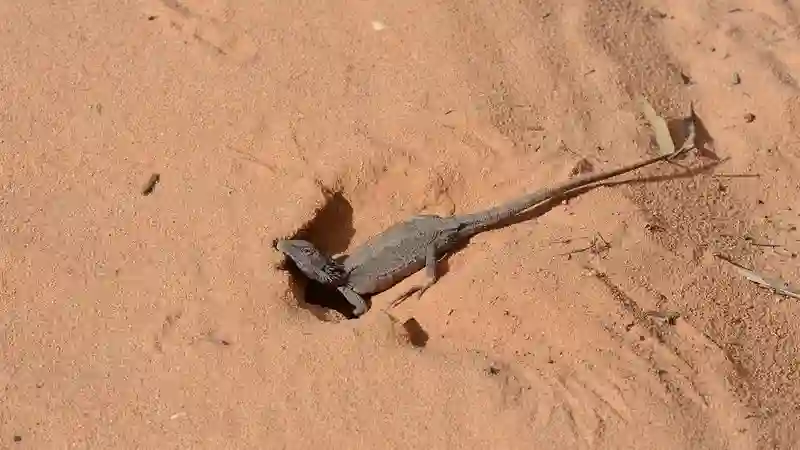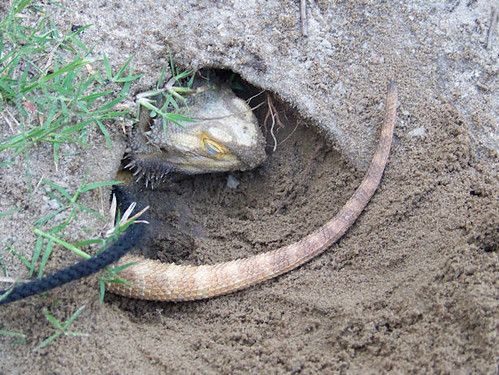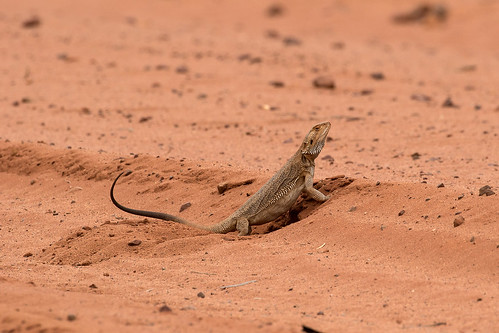Bearded dragons are known to dig, and it is a natural behavior for them. They may dig to regulate their temperature, prepare for brumation, or find a better basking spot. Female bearded dragons may also dig to prepare for laying eggs.
Is Digging Something To Worry About?
In most cases, digging is normal behavior for bearded dragons and is not necessarily a cause for concern and there is no need to stop it unless it becomes excessive.
Why Is My Bearded Dragon Digging?
There are several reasons why your bearded dragon may be digging, and we have outlined the most common ones below:
Nesting
Bearded dragons often dig to create a comfortable and secure nesting spot. They may dig in their substrate or rearrange items in their enclosure to make their environment more suitable for resting.
Establishing A Hiding Spot
Bearded dragons are naturally inclined to seek shelter and hiding spots for protection. They may dig to create a hidden space where they can feel safe and secure from potential threats.
Cooling Off
Digging can also be a way for bearded dragons to regulate their body temperature. By burrowing into the cooler substrate, they can escape the heat in their enclosure and maintain a comfortable temperature.
Feeling Cramped
If your bearded dragon’s enclosure is too small, it may resort to digging in an attempt to create more space for itself. Ensure that your pet has ample room to move around, climb, and bask.
Brumation
Brumation is a form of hibernation that bearded dragons undergo during colder months. During this time, they may dig to find a suitable spot to brumate and conserve energy.
Egg Laying
Female bearded dragons may dig to create a suitable place to lay their eggs. If your female bearded dragon is gravid, provide a suitable nesting box filled with moist substrate to facilitate egg-laying.
Why Is My Bearded Dragon Digging In The Corner?
If your bearded dragon is digging in the corner of its enclosure, it may be trying to create a hiding spot, nesting area, or seeking a cooler place to regulate its body temperature. Observe your pet’s behavior and assess the enclosure’s conditions to determine the appropriate action to take.
Is Burrowing Normal Behavior?
Yes, burrowing is a normal behavior for bearded dragons. They often burrow in the wild to escape predators, find a cool spot, or create a comfortable resting area. However, it’s essential to monitor your pet’s overall health and ensure that its enclosure is well-maintained to prevent any potential issues.
Steps To Take When Your Bearded Dragon Is Digging
To ensure your bearded dragon’s well-being, consider the following steps when you observe them digging:
Evaluate Enclosure Conditions
Ensure that your bearded dragon’s enclosure is the appropriate size, has proper temperature gradients, and provides a variety of hiding spots and climbing opportunities. A well-maintained enclosure can help reduce stress-related digging behaviors.
Check For Health Issues
Monitor your bearded dragon for any signs of illness or discomfort, such as lethargy, loss of appetite, or changes in coloration. If you suspect a health issue, consult a reptile veterinarian immediately.
Provide Appropriate Substrate
Offer a substrate that encourages natural digging behavior, such as a mix of organic topsoil and sand. Avoid using materials that could be harmful to your bearded dragon, such as cedar shavings or gravel.
Ensure Proper Nutrition
Providing a balanced and varied diet is crucial for your bearded dragon’s overall health. Ensure that they receive a mix of insects, vegetables, and fruits, along with appropriate supplements to meet their nutritional needs.
Monitor Brumation Behavior
If your bearded dragon is exhibiting signs of brumation, ensure that their enclosure remains within the appropriate temperature range and monitor their weight and health throughout the process. Consult a reptile veterinarian if you have concerns about your pet’s brumation habits.
Offer A Nesting Box
For female bearded dragons that may be gravid, provide a nesting box with moist substrate to facilitate egg-laying. Monitor her behavior closely and seek veterinary assistance if she shows signs of distress or difficulty laying eggs.
Create Enrichment Opportunities
Offering enrichment activities, such as climbing branches, basking spots, and hiding areas, can help alleviate boredom and reduce stress-related digging behaviors. Regularly change the layout of the enclosure to keep your bearded dragon engaged and stimulated.
Observe and Adjust
Regularly observe your bearded dragon’s behavior and make adjustments to their environment as needed. If digging persists despite addressing potential causes, consider seeking advice from a reptile veterinarian or specialist to rule out any underlying health issues.
In conclusion, while digging is a natural behavior for bearded dragons, understanding the reasons behind it can help you provide the best possible care for your pet.



